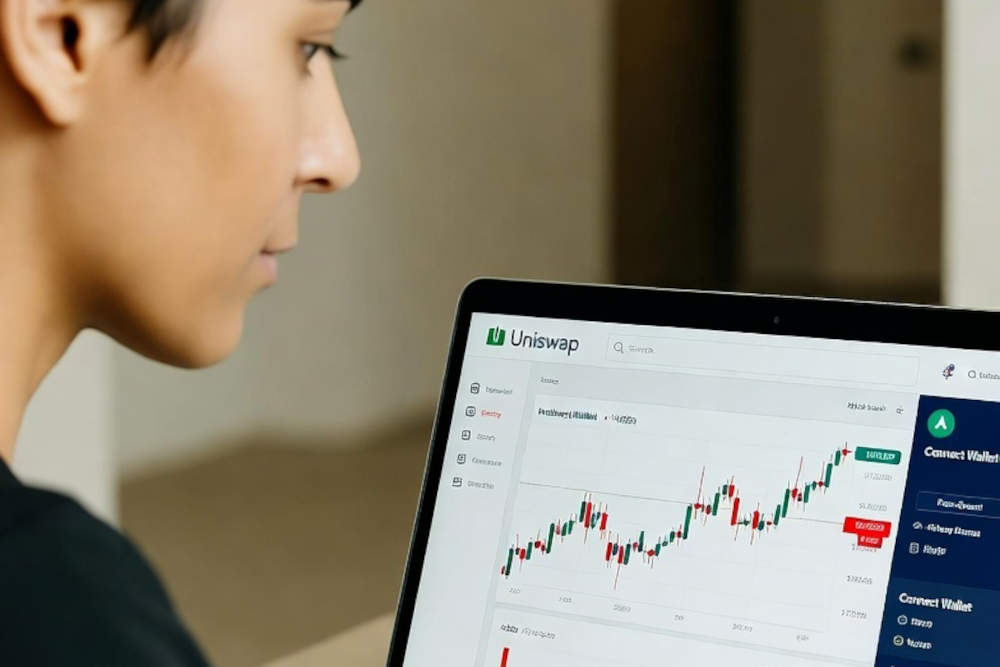
Les plateformes d'échange décentralisées (DEX) demeurent un pilier essentiel de la finance décentralisée (DeFi), offrant aux utilisateurs la possibilité d'échanger des tokens de pair à pair sans intermédiaires centralisés. Si Uniswap reste un acteur majeur, l'écosystème des DEX a considérablement évolué, proposant désormais un éventail d'alternatives aux avantages uniques. Dans cet article, nous explorerons les raisons pour lesquelles vous pourriez envisager une alternative à Uniswap, passerons en revue les meilleures options disponibles actuellement et vous guiderons dans le choix de la DEX la mieux adaptée à vos besoins.
Panaprium est indépendant et pris en charge par les lecteurs. Si vous achetez quelque chose via notre lien, nous pouvons gagner une commission. Si vous le pouvez, veuillez nous soutenir sur une base mensuelle. La mise en place prend moins d'une minute et vous aurez un impact important chaque mois. Merci!
Pourquoi envisager une alternative à Uniswap ?
Bien qu'Uniswap soit largement utilisé et digne de confiance, plusieurs raisons peuvent amener un investisseur ou un trader à rechercher des alternatives :
-
Frais et coûts de gaz : Selon le réseau et la version d’Uniswap utilisés, les frais de transaction (surtout sur le réseau principal Ethereum) peuvent être élevés. Des alternatives peuvent proposer des coûts inférieurs ou être construites sur des blockchains où les frais de gaz sont moins élevés.
-
Compatibilité avec les chaînes/actifs : Certains DEX fonctionnent sur plusieurs chaînes (BSC, Avalanche, Solana, etc.) ou prennent en charge des ensembles de jetons de niche qu’Uniswap ne répertorie pas.
-
Fonctionnalités et incitations : Certaines plateformes proposent un yield farming amélioré, des incitations à la liquidité ou des mécanismes de pool innovants.
-
Glissement, routage et efficacité : Face à une concurrence croissante, les agrégateurs DEX et les AMM spécialisés offrent parfois un meilleur routage, un glissement plus faible ou une exécution améliorée pour certaines transactions.
-
Diversification des risques : L'utilisation de plusieurs DEX peut atténuer les risques spécifiques à chaque plateforme (par exemple, les interruptions de service, les piratages, les bugs des contrats intelligents).
Ainsi, même si Uniswap reste une plateforme solide, examiner des alternatives vous permet d'optimiser les coûts, l'accès et les fonctionnalités.
Qu'est-ce qui fait un bon DEX ?
Lors de l'évaluation des alternatives au DEX, tenez compte des critères clés suivants :
-
Historique de sécurité et d'audit – Les audits des contrats intelligents, les performances passées et l'ancienneté de la plateforme sont importants.
-
Liquidité et volume – Plus de liquidité signifie une meilleure exécution et moins de dérapage.
-
Structure tarifaire et efficacité du gaz – Des frais réduits améliorent l'expérience utilisateur, notamment pour les petites transactions.
-
Prise en charge multi-chaînes / couverture de jetons – Possibilité d'échanger sur plusieurs chaînes ou de trouver des jetons de niche.
-
Efficacité de l'interface utilisateur et du routage – Agrégation, minimisation de l'impact sur les prix, bonne expérience utilisateur.
-
Incitations / rendement pour les fournisseurs de liquidités (LP) – Si vous souhaitez fournir des liquidités, les récompenses sont importantes.
-
Risques liés à la réglementation et à la juridiction – Certaines plateformes peuvent rencontrer des obstacles réglementaires en fonction de la chaîne ou de la région.
Partant de ce constat, examinons les meilleures alternatives à Uniswap en 2025.
Principales alternatives à Uniswap
1. SushiSwap

-
Initialement dérivé d'Uniswap, SushiSwap propose un modèle AMM similaire, enrichi de fonctionnalités telles que le yield farming, le staking de son jeton de gouvernance (SUSHI) et des incitations à la liquidité plus attractives. ( Blocktrade )
-
Avantages : Plateforme établie, prise en charge de plusieurs chaînes (Ethereum, Polygon, etc.), récompenses supplémentaires.
-
Inconvénients : Liquidité légèrement inférieure à celle d'Uniswap ; risques liés à la tokenomics et aux modèles d'incitation.
-
Cas d'utilisation : Si vous êtes un fournisseur de liquidités à la recherche de rendement et de possibilités d'échange, SushiSwap est un excellent choix.
2. Échange de crêpes


-
Fonctionnant principalement sur la Binance Smart Chain (BSC) et d'autres blockchains, PancakeSwap propose des frais réduits et de nombreuses fonctionnalités ludiques (loterie, objets de collection, etc.). ( Wikipedia )
-
Points forts : Excellente performance sur BSC en termes de volume et de liquidité ; faibles coûts de transaction ; interface utilisateur attrayante.
-
Inconvénients : Être sur BSC implique un écosystème/des risques quelque peu différents ; il peut y avoir moins d'intégrations Ethereum-DeFi.
-
Cas d'utilisation : Idéal pour les utilisateurs à l'aise avec BSC recherchant des transactions moins chères, des fonctionnalités amusantes et des fermes de rendement.
3. 1 pouce (Portefeuille et agrégateur)

-
1inch n'est pas qu'une simple plateforme d'échange décentralisée (DEX) ; c'est un agrégateur de DEX qui centralise les liquidités provenant de plusieurs plateformes et achemine les transactions pour une exécution optimale. ( Alchemy )
-
Avantages : Excellent pour trouver les taux optimaux, réduire le slippage et accéder à différents DEX via une seule interface.
-
Inconvénients : Peut-être plus complexe pour les débutants ; se concentre sur le routage/le trading plutôt que sur la fourniture de liquidités.
-
Cas d'utilisation : Les traders recherchant le meilleur prix possible sur différentes chaînes de trading, ou ceux effectuant des échanges fréquents.
4. Curve Finance

-
Bien que Curve ne soit pas une plateforme d'échange décentralisée (DEX) généraliste de type « Uniswap », elle se spécialise dans les stablecoins et les swaps de cryptomonnaies à faible volatilité avec un slippage minimal. ( wundertrading.com )
-
Avantages : Extrêmement efficace pour les échanges de stablecoins ; faible slippage ; opportunités de rendement pour les LP.
-
Inconvénients : Moins adapté aux nouvelles paires de jetons ou aux échanges de jetons en général, en dehors des stablecoins.
-
Cas d'utilisation : Si vous échangez fréquemment des stablecoins ou si vous avez besoin de liquidités pour ceux-ci, Curve est un excellent choix.
5. KyberSwap / Réseau Kyber



-
Kyber Swap agit comme un DEX multi-chaînes et un agrégateur qui collecte des liquidités auprès de nombreuses chaînes et DEX. ( defiprime.com )
-
Avantages : Multi-chaînes, bon routage, combinaison de fonctionnalités AMM et d'agrégateur.
-
Inconvénients : Le volume peut être inférieur à celui des plus grands DEX ; la concurrence avec les principaux agrégateurs demeure.
-
Cas d'utilisation : Pour les utilisateurs qui effectuent des transactions sur plusieurs plateformes et qui recherchent de la flexibilité.
Comment choisir le DEX qui vous convient le mieux ?
Voici une liste de contrôle pour vous aider à évaluer et à choisir la bonne alternative :
-
Taille et fréquence des transactions : Pour les petites transactions, les chaînes à faibles frais ou les agrégateurs sont importants.
-
Écosystème de la blockchain : Travaillez-vous principalement sur Ethereum ? BSC ? Avalanche ? Choisissez un DEX performant sur votre blockchain.
-
Paires de jetons : Certains DEX peuvent lister des jetons de niche ou nouveaux qu'Uniswap ne propose pas forcément.
-
Besoins de liquidités : Vérifiez la taille des pools ; faible liquidité = risque de glissement élevé.
-
Opportunités de rendement (en cas de prêteur sur gages) : Si vous fournissez des liquidités, comparez les programmes d'incitation.
-
Sécurité et historique : La plateforme a-t-elle présenté des vulnérabilités ou des failles de sécurité ?
-
Interface utilisateur et complexité : Les agrégateurs peuvent proposer le meilleur prix, mais au prix d'une plus grande complexité.
-
Gaz et frais : particulièrement importants sur le réseau principal Ethereum ; des alternatives peuvent vous faire économiser beaucoup.
-
Interopérabilité et interconnexion de chaînes : Si vous prévoyez d'effectuer des échanges entre chaînes, les DEX/agrégateurs multi-chaînes sont avantageux.
Tendances futures et ce qu'il faut surveiller
-
Expansion multichaîne : Davantage de DEX prenant en charge plusieurs chaînes, et pas seulement Ethereum.
-
Modèles hybrides : Les modèles hybrides AMM + carnet d'ordres peuvent offrir une meilleure formation des prix et un routage efficace.
-
Adoption de la couche 2 : À mesure que les couches L2 (Arbitrum, Optimism, Base) se développent, les DEX sur ces couches peuvent offrir des frais moins élevés et des transactions plus rapides.
-
Domination des agrégateurs : une attention accrue portée aux agrégateurs qui centralisent les liquidités et optimisent les swaps sur de nombreuses plateformes.
-
Intégrations plus poussées : portefeuilles électroniques, robots de routage intelligents, meilleure interface utilisateur pour les utilisateurs non techniques.
-
Gouvernance et tokenomics : Les plateformes proposant des tokens natifs avec staking, gouvernance et rendement peuvent attirer les utilisateurs.
-
Sécurité et réglementation : La réglementation des DEX s'améliore, mais les audits, la décentralisation et la conception restent essentiels.
Réflexions finales
Si vous utilisez exclusivement Uniswap, il est judicieux d'explorer d'autres plateformes. Elles peuvent offrir des frais réduits, un meilleur routage, une plus grande diversité de blockchains et des fonctionnalités uniques, selon vos objectifs de trading ou de fourniture de liquidités. Que vous soyez un trader en quête de la meilleure exécution ou un fournisseur de liquidités souhaitant optimiser vos revenus, le DEX le plus adapté à vos besoins spécifiques sera celui qui vous convient le mieux.
En utilisant la liste de contrôle d'évaluation ci-dessus et en expérimentant avec 1 ou 2 alternatives performantes (par exemple, SushiSwap pour le rendement, 1inch pour le routage, PancakeSwap pour des échanges de chaînes économiques), vous serez mieux placé pour optimiser votre expérience DeFi.
Cet article vous a-t-il été utile ? S'il vous plaît dites-nous ce que vous avez aimé ou n'avez pas aimé dans les commentaires ci-dessous.
Avertissement: Le contenu ci-dessus est fourni à titre informatif et éducatif uniquement et ne constitue en aucun cas un conseil financier ou d'investissement. Effectuez toujours vos propres recherches et envisagez de consulter un conseiller financier ou un comptable agréé avant de prendre toute décision financière. Panaprium ne garantit ni n'approuve nécessairement le contenu ci-dessus, et n'en est en aucun cas responsable. Les opinions exprimées ici sont basées sur des expériences personnelles et ne doivent pas être considérées comme une approbation ou une garantie de résultats précis. Les décisions d'investissement et financières comportent des risques, dont vous devez être conscient avant de prendre des décisions.
About the Author: Alex Assoune
Contre Quoi Nous Luttons
Les groupes multinationaux surproduisent des produits bon marché dans les pays les plus pauvres.
Des usines de production où les conditions s’apparentent à celles d’ateliers clandestins et qui sous-payent les travailleurs.
Des conglomérats médiatiques faisant la promotion de produits non éthiques et non durables.
De mauvais acteurs encourageant la surconsommation par un comportement inconscient.
- - - -
Heureusement, nous avons nos supporters, dont vous.
Panaprium est financé par des lecteurs comme vous qui souhaitent nous rejoindre dans notre mission visant à rendre le monde entièrement respectueux de l'environnement.
Si vous le pouvez, veuillez nous soutenir sur une base mensuelle. Cela prend moins d'une minute et vous aurez un impact important chaque mois. Merci.



















0 commentaire